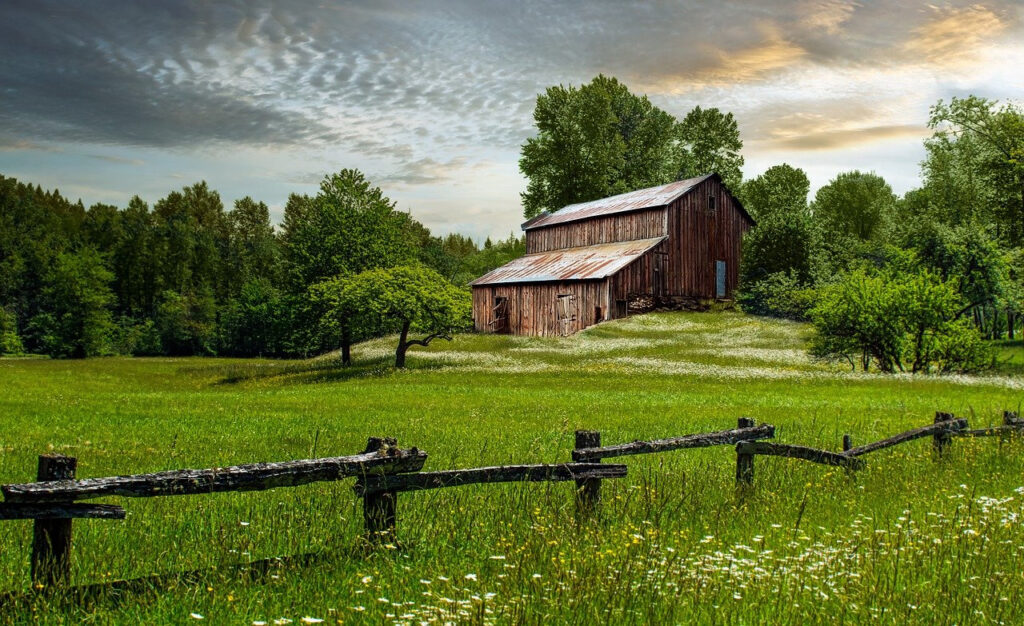
Homesteading for Beginners
So you wanna homestead? Maybe the past year has shown you that disruptions in the supply chain can be very scary and you don’t like the feeling of having to depend on the system to feed you. Or you want to have more control over how your meat is raised and what it’s fed and the environment it lives in.
After learning about how conventionally raised livestock is raised and how they live in cement builds and sometimes have never seen grass, sun, or even felt dirt. This really upset me. I knew that by continuing to buy conventionally raised meat I am supporting that model.
Many times these animals are crammed into these buildings and it’s overcrowded and they are fed lots of grain to fatten them up quickly. They also are usually given antibiotics on a regular basis because they are in overcrowded buildings and the ventilation is poor. To keep the animals from getting sick they have to give them antibiotics. And guess what? Those antibiotics are in their meat. I don’t want that in my food. If I need antibiotics I go to my doctor myself. I don’t need to be consuming meat with antibiotics.
I don’t have enough land to raise my own beef. However, I can choose to support local farmers and ranchers that raise animals in a more sustainable manner. So I raise and grow what I can and I buy the rest. Sometimes buying pasture-raised isn’t always in the budget but that’s ok. I try my best. I know I’m doing better than I did just a few years ago. And each year we become more and more self-sufficient.
How We Began Homesteading
We have been homesteading ourselves for several years. We have had egg-laying chickens and a big veggie garden for 13 years and then 4 years ago we started raising sheep and goats. The goats provide us with raw milk and the sheep provide meat. We are not anywhere near being fully self-sufficient but that’s ok. I feel better knowing that I can still provide a good amount of food ourselves.
Originally what sparked my interest in homesteading was my own chronic health issues. The more research I did the more I realized diet was a big part of good health. The conventionally grown produce I was buying was ridden with pesticides. I didn’t even know about GMO’s and how they can impact your health. The more and more I read the stronger my desire was to homestead and grow my food.
With the past 2 years of the pandemic and supply chain issues I realized how reliant we still are on stores for our basic needs.
Personally, the anxiety and worry I felt from not being able to get the supplies I needed really bothered me. I hated that feeling. The only way for me to get rid of this feeling was to become less dependent on others and more self-reliant.
Nowadays I preserve, dehydrate fruit, and can vegetables and soups, I ferment veggies and buy in bulk what I can. Being prepared gives me peace of mind. There is so much that is out of our control. Knowing that I can feed my family for weeks or months without going to a store gives me comfort.
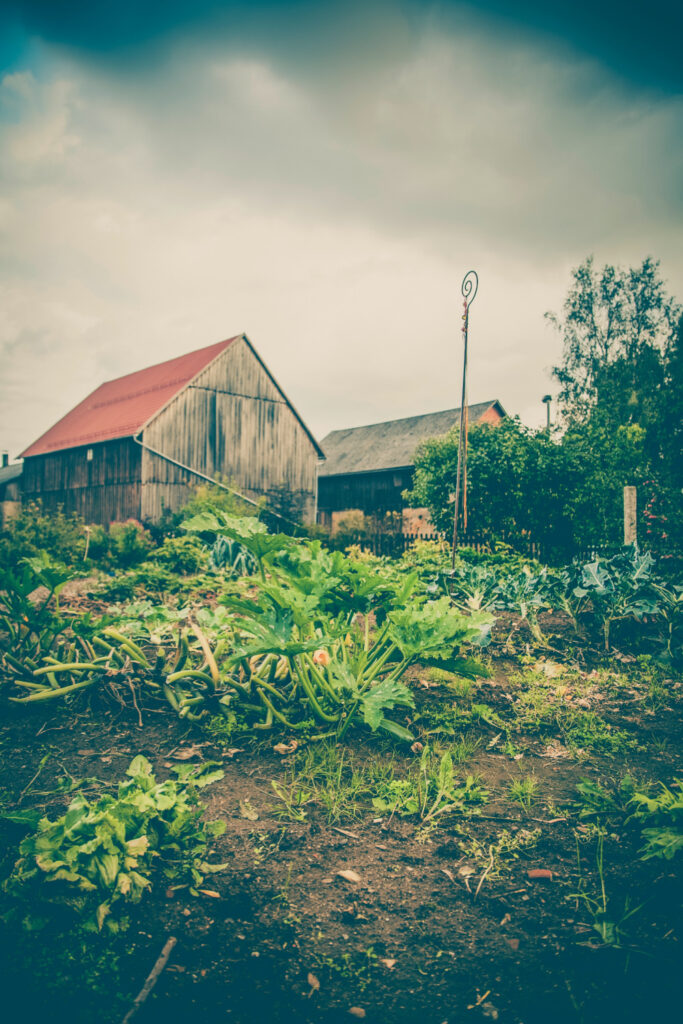
What is Homesteading?
In today’s terms homesteading is living a more self-sufficient lifestyle by growing a vegetable garden and raising livestock. Homesteading or urban homesteading can look different for each family.
Some might just have a large garden and backyard chickens and do a lot of canning. Others might have a goal to grow and raise 50% of their own food and others want to grow 100%. It’s different for everyone. Generally, though, most agree homesteading is about becoming as self-reliant as you can.
You don’t need a ton of land to be able to homestead. I know people who live on 1/4 of an acre who have backyard chickens, meat rabbits, and grow a lot of their own food. Instead of having a grass lawn, they are utilizing most of their land to grow their own food.
A hundred and sixty years ago homesteading meant something different. The Homesteading Act of 1862 was signed by President Lincoln on May 20th, 1862. The Homestead Act, enacted during the Civil War in 1862, stated that any adult citizen, or future citizen, who had never borne arms against the U.S. government could claim 160 acres of land.
Those who claimed land were required to “improve” the plot by building a dwelling and cultivating the land. After 5 years on the land, the citizen could file for a deed and pay a small registration fee.
Important Skills for Homesteading
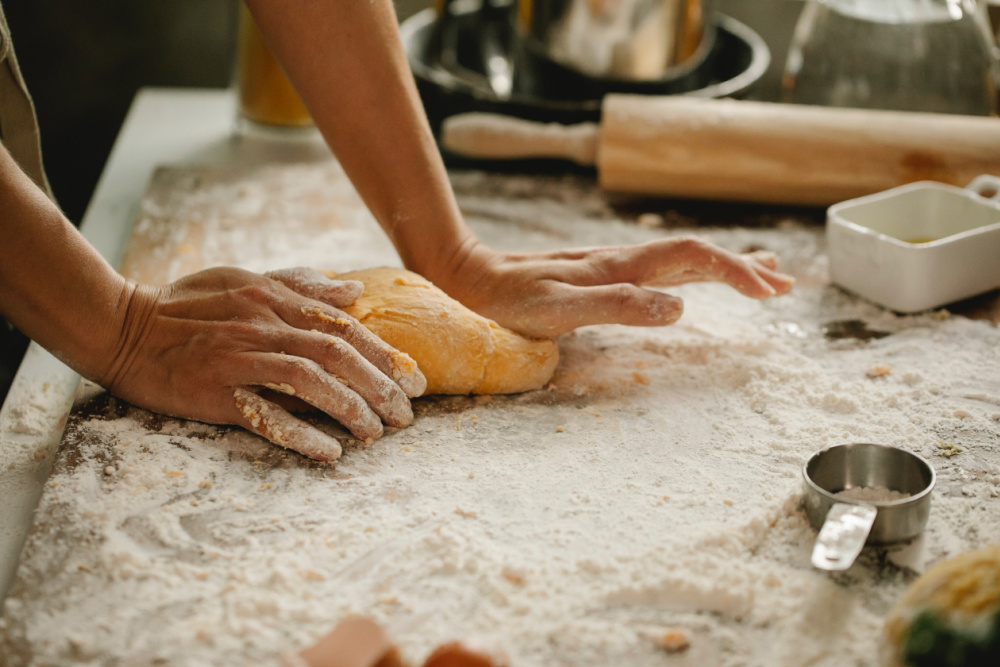
Cooking from scratch – Learning to cook from scratch is essential to homestead. The whole premise is to become less dependent on stores. Learning to make your own pasta noodles or bake your own bread is actually fairly easy. Once you start making your own bread it’s really hard to go back to store-bought bread. Have you ever looked at all the ingredients in a loaf of bread? It’s crazy. It’s healthier for you to eat homemade from scratch anyways.
Hunting – Learning to hunt saves money. Yes of course you’re out the cost of a hunting license but hunting is a source of ethical and healthy meat. Hunting helps prevent damage to crops.
Fishing – Fishing provides meat and is a great way for you to lower stress.
Foraging – Foraging is fabulous, fun and it’s free! Mushroom foraging is my favorite. It’s important to never eat a mushroom unless you are certain it’s edible. It is a good idea to learn from an experienced mushroom hunter. There are so many edible plants and medicinal herbs and plants in the wild. It is important to learn about edible plants available in your region.
Cutting firewood and learning trees – It’s important to learn what wood burns best and for how long and how to identify it. Learning the difference between green, dried, and seasoned wood is good. You will need to learn about hardwoods versus softwoods.
It’s also important to learn how to sweep your own chimney. Having a wood-burning fire is so nice. It is a nice dry heat. If the power goes out you have another heat source. It is also is cheaper to heat with firewood than electricity.
Where we live you can get a firewood permit at our local forest service office. Here you’re allowed up to 6 cords of wood a year and it only costs $5. You need to check with your local Forest Service office for more info on that. Here is some websites with additional info I found useful in helping me learn more about trees and different types of firewood. Burly Beaver and Arbor Day Foundation helped me learn more about trees.
Growing and caring for fruit trees – Having fruit trees seems simple enough but there are some things that need to be known. Some fruit trees are self-pollinating and others need to have another pollinator nearby. Learning the types of fungus or diseases or pests that can afflict fruit trees is also a good thing to educate yourself on. Your local extension office can provide the best information for your area. Learning the proper way to prune fruit trees is good too.
Permaculture – The way I describe permaculture is a holistic full circle way of managing the land. Becoming good stewards of the land. One example of permaculture gardening would be no-till gardens or mulching. Not only is it good for the gardener because it cuts down on weeding it also builds up the soil and as the mulch decomposes it feeds the soil.
Another example would be kitchen scraps going on a compost pile or being used to feed livestock or vegetables from the garden that are past their prime getting used as mulch and adding nutrients back into the soil. One of my favorite resources for permaculture learning and homesteading is Justin Rhodes website called Abundant Permaculture.
Grow a vegetable garden – This is the first thing we did on our homestead. There is nothing like fresh vegetables you grew yourself. It costs very little to buy seeds and the payoff is big. Start by finding out your growing zone for your location.
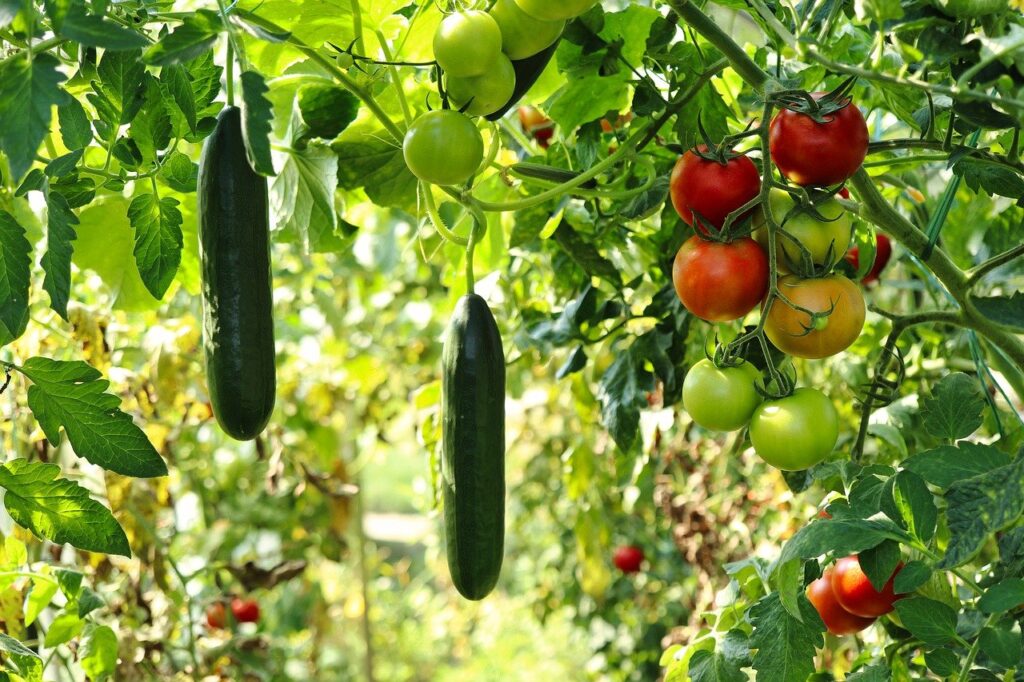
Compost – Start composting all the kitchen scraps. Put all the grass clippings from mowing your lawn on a compost pile. Straw bedding or shavings and waste from animal stalls and pens make great compost after broken down. Our compost pile is loaded with huge worms. This is a sign of healthy soil. Every year I add some of this compost to my garden beds.
Canning – Learning to preserve your own harvest is so rewarding. Canning or pressure canning doesn’t have to be overwhelming. I have found that the best information was through my local county extension office. Many times these extension offices will offer canning classes as well.
Soap making – I was surprised by how easy it was to make soap. I also noticed my skin really improved. I don’t think I can ever go back to commercial soaps.
Sewing – Learning to sew is a basic skill everyone should know how to do. You don’t need a fancy expensive sewing machine either. On the homestead, there will be many things that need to be repaired or hemmed.
How to butcher animals – If you want to raise your own livestock you can either have a butcher come out to your homestead and butcher or you can do it yourself. Right now as I’m writing this butchers in our area are booked out 9-12 months to come out and butcher at your own homestead or farm. For a lot of us, that means we either continue to pay for feed or hay for the animal and wait an extra 12 months or we butcher ourselves. Butchering yourself is obviously a cheaper option. Youtube has some videos on how to butcher livestock.
Herbalism – Learning herbal medicine is a great way to take care of your family especially during the cold and winter months when it is cold and flu season. There are so many books on this subject. Herbalist like Rosemary Gladstar and Matthew Wood, Kiva Rose & Jesse Wolf Hardin, Stephen Buhner, Sajah Popham all have excellent books on herbalism. Those are just a few I recommend.
Fermenting Foods – For ages people have fermented foods to improve flavor or enhance shelf life. But consuming fermented food is also a great way to improve your overall health. Eating fermented foods is good for your gut microbiome which is where a good portion of your immune system is located. You can read more about gut health in this post here. A great resource to buy fermenting supplies and cultures is the website Cultures for Health.
Start with Small Goals
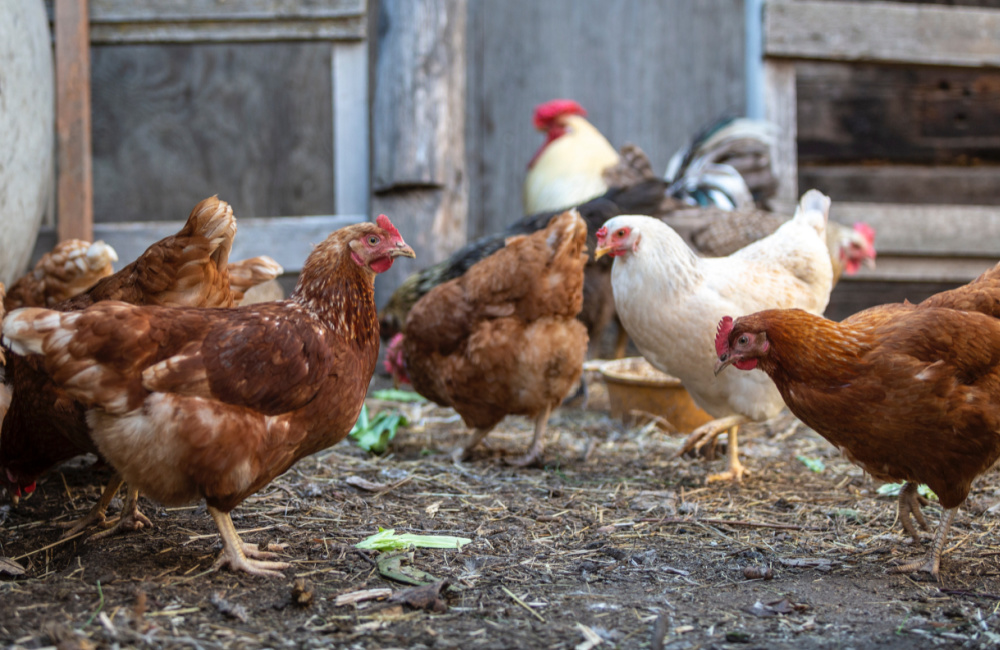
The advice I would give people just starting out homesteading would be to get some backyard chickens and start a vegetable garden first. Learn some preserving techniques like canning, dehydrating, and fermenting. Read up on how to care for chickens. Learn how to build a chicken coop.
Here are some links for free chicken coop plans.
Chickens are the easiest to care for. Next to chickens, I would say sheep can be fairly easy to keep if you have a hardy breed like Soay or St Croix. Both are disease-resistant and shed their own wool in spring. We have Soay sheep, I will say the Soay sheep are easier to keep than our goats.
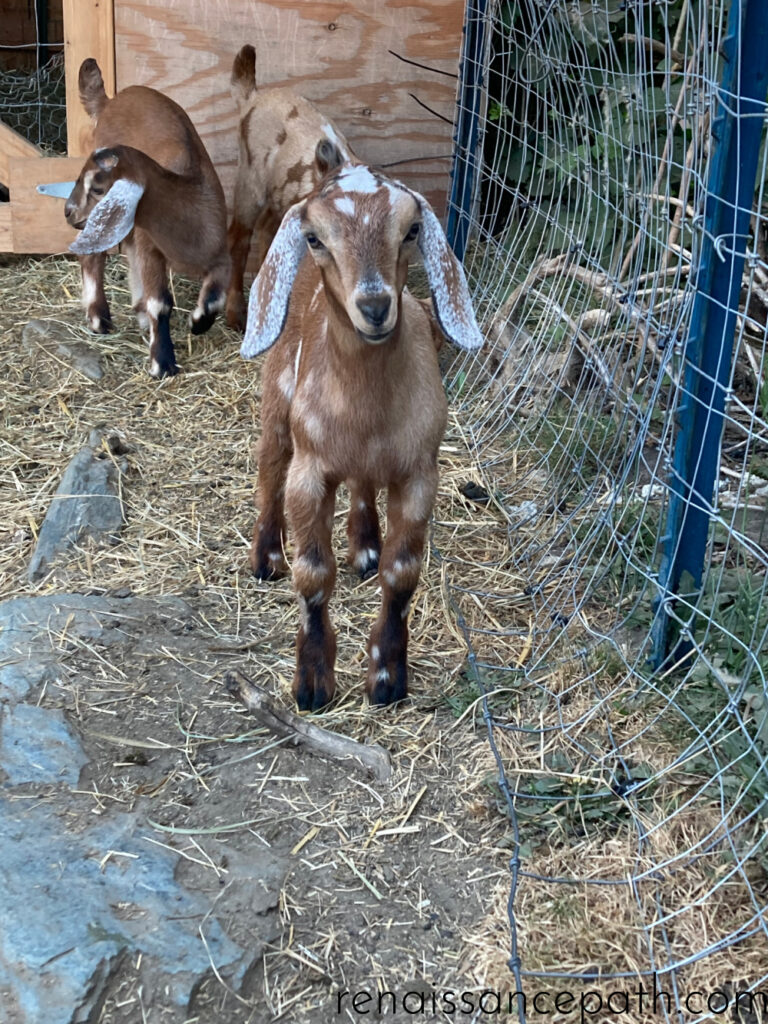
Then next in line would be goats. Goats are fairly easy to keep. They just need proper fencing, shelter, hay, and minerals. You also need to trim hooves every few months. Small dairy goats like Nigerian Dwarf goats are perfect for a small homestead. We have Nigerian Dwarf and Mini Nubians. These goats are small enough for my kids to handle and also myself having arthritis in both my wrists and my hands I can still handle the goats pretty well.
Build a Goat/Sheep Shelter
Goats hate getting wet. They will go to any lengths to NOT step in a puddle of water. Shelter is a must for goats and sheep. Some sheep don’t mind getting wet. But goats….they for sure have a deep repugnance for wet weather.
You can make a goat shelter for next to nothing. You can even nail together a few pallets with a tarp over it. Goats and sheep need a way to get out of the wind, rain, and snow so they can stay warm. Deep dry bedding is a good way for them to stay warm during those cold wet winter months.
When deciding what type of shelter to build you need to ask yourself the following questions.
Do you want your goat/sheep shelter to be portable? Do you need to worry about predators and do the animals need to be locked up at night? If you have pregnant ewes or does, you will need to have kidding pens and lambing pens for when they go into labor. Does your shelter need to be tall enough so you can get inside in case you need to help a sick goat out or assist a goat in labor? These are all things you need to consider when building or buying your shelter.
Here are some links to goat/sheep shelters.
Planning your garden
Planning your garden ahead of time is a good idea. You could just throw seeds down and see what happens. But let me tell you it works way better if you really sit down and think about what kinds of foods your family eats.
What foods do they enjoy more than others? And what foods store the best long term? How much room do certain crops take up versus other crops? What time of year is best to plant? Should you direct seed or plant starts and keep in your house or greenhouse? Or do you need to wait till the ground is 70 degrees or warmer in order to plant? Knowing all these things is crucial.
One of my favorite homesteading bloggers is Melissa K Norris and she has a book called The Family Garden Plan. I highly recommend this book. It walks you through the whole process of setting up your family garden.
Where to Purchase Seeds
You can always purchase seeds at your local farm and ranch store or Home Depot or Lowes. Even the grocery stores carry seed packets. Recently I have moved over to ordering from seed catalogs like Johnny’s Select Seeds, and Baker Creek Heirloom. For flower seeds, I love Floret Flowers.
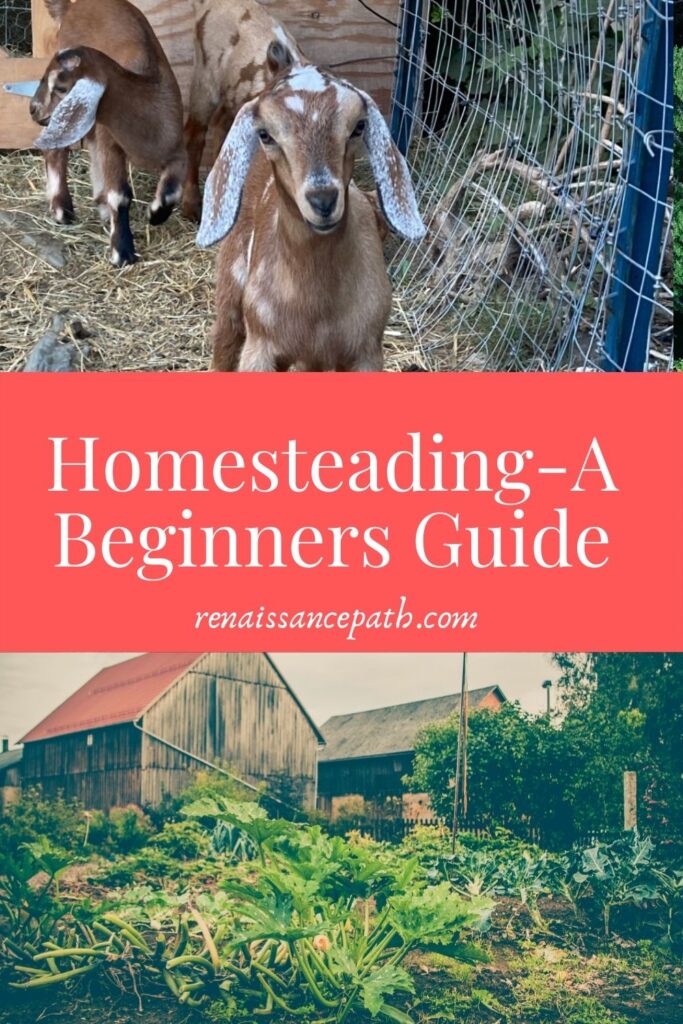
Final Thoughts
In an effort to keep this post not too long, I really tried to touch on the basics. Of course, I could go into more depth and I will in other posts about each subject. Homesteading is a journey and you will make many mistakes and that’s ok, look at them as a learning experience. Making mistakes is how we grow. You will also have many triumphs.
There is something so wonderful about growing your own food and not having to depend on others. The freedom it provides is amazing. Have you started your homesteading journey? I’d love to hear from you? Leave me a comment below!
Much Love,
Melissa
This website is for educational purposes only. The information provided by Renaissance Path is not intended to diagnose, treat, or cure any diseases. Please consult a qualified health care professional for medical advice.
Leave a Reply